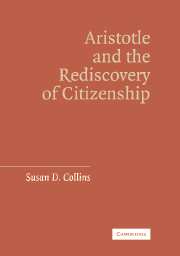Book contents
- Frontmatter
- Contents
- Acknowledgments
- Aristotle and the Rediscovery of Citizenship
- Introduction: The Rediscovery of Citizenship
- 1 Liberal Citizenship and Aristotle's Ethics
- 2 Citizen Virtue and the Longing for the Noble
- 3 Justice as a Virtue
- 4 Prudence, the Good Citizen, and the Good Life
- 5 Citizenship and the Limits of Law
- 6 Political Wit and Enlightenment
- Conclusion: Aristotle and the Rediscovery of Citizenship
- Bibliography
- Index
6 - Political Wit and Enlightenment
Published online by Cambridge University Press: 17 July 2009
- Frontmatter
- Contents
- Acknowledgments
- Aristotle and the Rediscovery of Citizenship
- Introduction: The Rediscovery of Citizenship
- 1 Liberal Citizenship and Aristotle's Ethics
- 2 Citizen Virtue and the Longing for the Noble
- 3 Justice as a Virtue
- 4 Prudence, the Good Citizen, and the Good Life
- 5 Citizenship and the Limits of Law
- 6 Political Wit and Enlightenment
- Conclusion: Aristotle and the Rediscovery of Citizenship
- Bibliography
- Index
Summary
Leading up to his account of justice in the Nicomachean Ethics, Aristotle discusses three virtues that pertain to “our associations” and “the speeches and deeds of our common relations”: friendliness (philia, lit. “friendship”), truthfulness, and wittiness (NE 1126b11–12). His account of these virtues is prepared by his treatment of the nameless characteristic pertaining to anger, which he chooses to call “gentleness” (praotēs). Generally speaking, the person who possesses this virtue becomes angry “in the circumstances and at whom he ought, and further in the manner, when, and for as much time as he ought” (NE 1125b31–2). In choosing to name the virtue “gentleness,” Aristotle associates it with its also nameless deficiency, and the gentle person in fact tends toward a deficiency of anger. The gentle person, who “wishes to be calm and led not by passion but as reason would command,” is more disposed to forgive than, as is more common, to seek revenge and punishment (NE 1125b33–1126a4, 1126a30). Indeed, this disposition toward forgiveness sometimes makes the gentle human being an object of blame rather than praise: He is thought to be a fool and slavish, for he appears to endure foul abuse and to overlook his own affairs (NE 1126a4–8). Moreover, in certain circumstances, not gentleness but harshness, the excess of anger identified as most opposed to the mean, is praised: Harsh human beings “are sometimes praised as manly on the grounds that they are able to rule” (NE 1126a36–b2).
- Type
- Chapter
- Information
- Aristotle and the Rediscovery of Citizenship , pp. 147 - 165Publisher: Cambridge University PressPrint publication year: 2006



